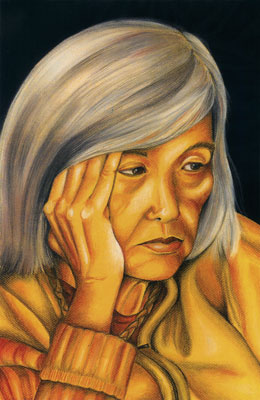All Nonfiction
- Bullying
- Books
- Academic
- Author Interviews
- Celebrity interviews
- College Articles
- College Essays
- Educator of the Year
- Heroes
- Interviews
- Memoir
- Personal Experience
- Sports
- Travel & Culture
All Opinions
- Bullying
- Current Events / Politics
- Discrimination
- Drugs / Alcohol / Smoking
- Entertainment / Celebrities
- Environment
- Love / Relationships
- Movies / Music / TV
- Pop Culture / Trends
- School / College
- Social Issues / Civics
- Spirituality / Religion
- Sports / Hobbies
All Hot Topics
- Bullying
- Community Service
- Environment
- Health
- Letters to the Editor
- Pride & Prejudice
- What Matters
- Back
Summer Guide
- Program Links
- Program Reviews
- Back
College Guide
- College Links
- College Reviews
- College Essays
- College Articles
- Back
Pioneers MAG
I gently tug at my grandmother’s hand as we push through the crowds of the morning market in Urumqi. The vendors’ cries hover at a certain pitch, blending with the aroma of fresh dim sum and spicy meat. I steer her toward my most anticipated destination – the naan stand.
“One yuan for two! Cheap naan!”
Naan is a local specialty: flatbread popular among Uyghurs, the largest ethnic minority of Xinjiang in northwest China. Delicious plain or with spiced mutton, it is a staple for even the Chinese immigrants who live here. The Uyghur vendor bags four from the stack of naan on the stand and hands them to me. I hug the still-warm bread to my chest and smile. We begin walking home; grandmother’s bound feet fail to hinder her strength. The street is thick with people. Someone steps on my foot and I jump even though I am used to this lack of personal space.
We pass the skyscrapers. To my left, a building with hollow windows and missing bricks is still under construction. My friends and I, starved for adventure, climbed it a couple weeks ago, forgetting our parents’ warnings. The city was our playground, and we were drawn to its towering promise by our overactive imaginations.
Standing on top of the building, I inhaled deeply and saw my city stretched out before me. I love it passionately, for its noise – the noise of open-air markets, frustrated traffic, and the children’s delighted screams as we pretended to be explorers and conquerors. I was filled with a desire to write of the crooked building’s hidden beauty. I longed to tell the world of the richness of life that I observed daily.
On my right, I can make out the outlines of elderly people stretching and doing tai chi in the park. I imitate the group of Uyghur girls dancing to Middle Eastern music and flipping their braids.
Urumqi is a city of contradictions. The Uyghur and the Chinese live in a delicate balance, with the two cultures crossing each other’s thin boundaries. I grew up oblivious to the politics of China’s struggle for power in Xinjiang. I knew only that I loved walking home from school in knee-deep snow and hearing Turkish accordions playing in the distance. I loved finding out that the Uyghur kids had the same rules for hide-and-seek.
One more block, and we enter the courtyard, already peppered with people milling about, chatting. The grandfather next door plays Chinese checkers with his daughter, and I join the cluster of onlookers and clamor to participate in the next round. I tear
off a piece of naan and pass the rest around to old and young hands. We are a family, sharing without hesitation.
The adults speak of the homelands they left behind for Xinjiang, a land with a name that translates to “new frontier.” In coming here, they have forged a new culture of Uyghur and Han traditions among neighbors who leave their doors open and chat under grapevine canopies while sipping tea.
I am a part of that fusion of cultures, a child of pioneers. And when I leave behind this continent, I will always carry with me the richness of our differences and the courage of understanding them.

Similar Articles
JOIN THE DISCUSSION
This article has 0 comments.
